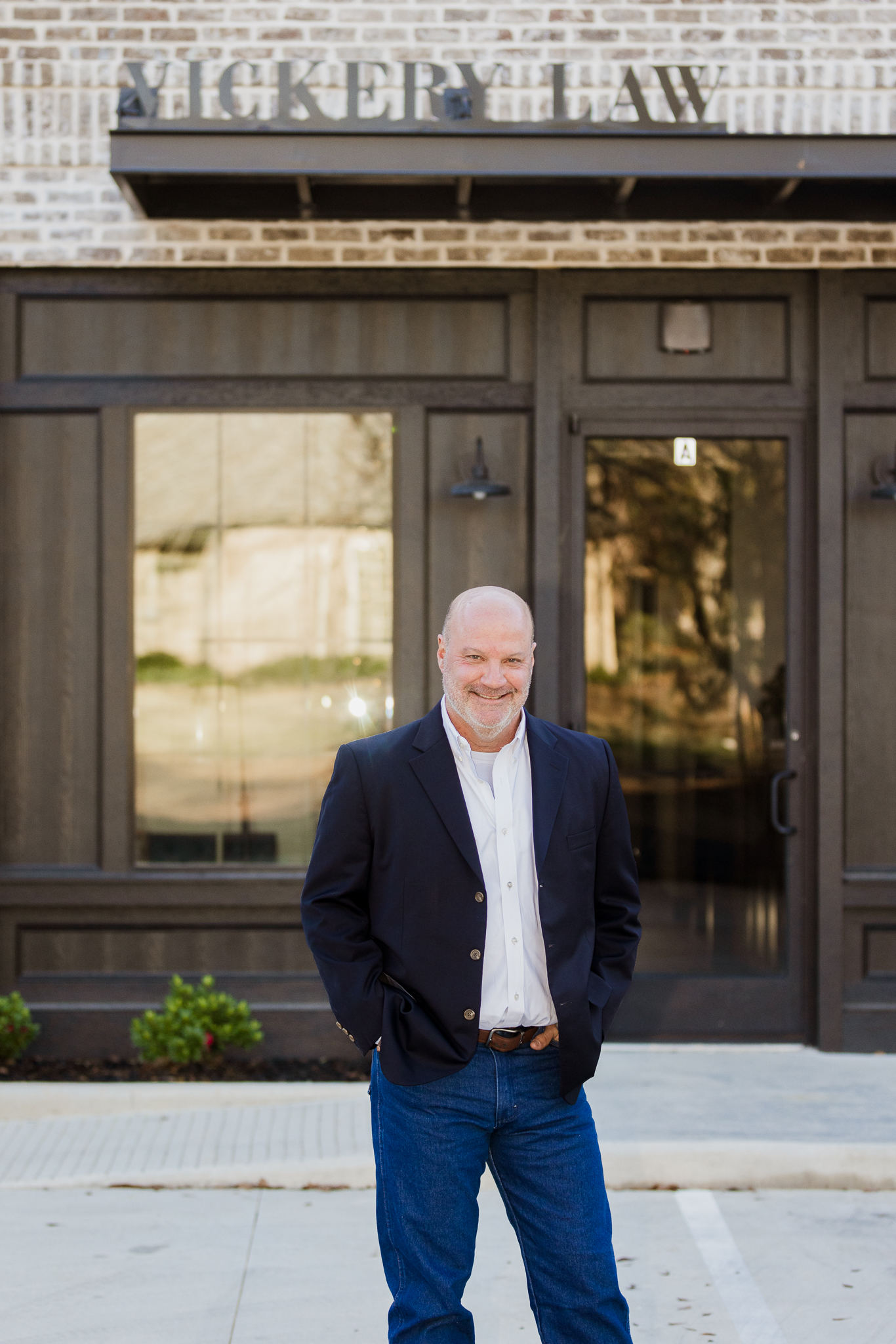
Vickery Law Firm: Fighting for Justice, Caring for You ~ Personal Injury
If you were injured in an accident, you need a lawyer you can trust. With over 30 years of experience practicing personal injury law in Texas, Attorney Vickery has the skills and knowledge you need to win your case. Getting compensation for a personal injury claim or lawsuit isn’t always easy, but with the help of the Vickery Law Firm, success is within reach.
Personal Injury: The Basics
Personal injury is an umbrella term that covers a wide range of different cases. Because it’s so widespread in its usage, many accident law firms often specialize in specific types of personal injury law. However, it’s not uncommon for attorneys to practice all cases.
What is personal injury?
Personal injury refers to any case in which there is harm done to a person’s body, emotions, or reputation. Also known as tort claims, personal injury claims are handled differently than property damage claims, although there are cases where both types of damage are present (such as with auto accidents). In order for a case to qualify as a personal injury, there has to be a quantifiable expense of physical damage. If you are unable to prove the exact amount of damage done, you’ll have a more difficult time getting the compensation you deserve.
While personal injury covers a range of cases, there are some common instances that most lawyers practice regularly. The most common injury cases include:
- Auto and Motorcycle Accidents
- Product Liability
- Worker’s Compensation
- Medical Malpractice
In order to get compensation for these cases, you have to prove that the injuries were caused by another person’s negligence, strict liability, or intentional wrong. Negligence is perhaps the most difficult case to prove. But by working with your personal injury attorney, you can find the evidence needed to win your case.
Potential evidence that can help secure compensation includes:
- Witness Testimony
- Doctor’s Records
- Lab Results
- Photos or Video of the Accident
What is negligence?
Negligence is the most common reason for a personal injury case. Negligence is when a breach of duty causes injury to the plaintiff. There are a few factors you need to be able to prove in a personal injury claim or lawsuit to be able to receive compensation.
- Duty: A duty must be ‘owed’ for negligence to be a factor. The duty is determined by the situation, and it must impact the way a person is supposed to act or not act in any given case.
- Breach of Duty: Negligence occurs when someone fails to perform their ‘owed’ duty properly.
- Cause in Fact: A plaintiff can file for personal injury if they can successfully prove that the breach of duty led directly to personal injury.
Let’s look at two examples of when negligence causes a personal injury case.
Example One
A patient goes to see a doctor for strange symptoms. The doctor gives them a diagnosis and prescribes medication. After taking the medication, the patient’s symptoms worsen. After seeking a second opinion, they learn that the first doctor misdiagnosed them.
In this case, the duty owed is the doctor’s responsibility to properly diagnose and treat their patients. Misdiagnosing the patient led to a breach of that duty. The misdiagnosis and wrong medication worsened the symptoms, leading to personal injury.
Example Two
A driver is merging lanes. They fail to signal and crash into a car in the other lane. The crash causes the other driver to experience whiplash.
In this case, the duty owed is a driver’s responsibility to stay aware of the other cars in traffic and properly indicate movement using turn signals. The breach of duty was the at-fault driver not using their signals to warn others of their intended move. This led to the other driver experiencing a physical injury, thus opening them up to a personal injury claim.
What is strict liability?
Strict liability is less likely to come up in personal injury cases. In strict liability, the defendant is responsible for damages caused regardless of the intent behind certain actions. The most common cases involving strict liability are product liability cases. In these instances, the plaintiff does not have to prove negligence for the at-fault party. Instead, their product liability lawyer must prove the faulty design.
An example of a strict liability case would be buying a car that has a faulty brake line. If there was no negligence in the process of producing and testing the car (i.e., the manufacturer and designer had no awareness of the defect before selling the vehicle), they are still responsible for any accidents caused. Proving strict liability is often easier than proving negligence, but still requires a great deal of legal legwork for your personal injury law firm.
What is intentional wrongs?
In some cases, the defendant willfully meant to harm the plaintiff, regardless of the specific intent behind it. Cases that deal with intentional wrongs often include instances such as assault and false imprisonment. Many of the situations that result in personal injury from intentional wrongs are also cases of criminal activity. Whether or not the defendant is charged with a crime has no effect on a personal injury claim or lawsuit. Filing for compensation is a civil proceeding and is not held in conjunction with criminal prosecution.
An example of a personal injury case where intentional wrongs play a part would be if someone got drunk and punched someone else in the face. While courts often prosecute assault as a crime, the plaintiff can choose to file just for personal injury and not press criminal charges. Deciding whether or not to press charges is up to the plaintiff. However, some cases of intentional wrongs may still lead to arrest charges if additional local or national laws are involved (such as drunk driving).
Personal Injury Insurance Claim VS Personal Injury Lawsuit
When seeking compensation for a personal injury, you have two main options to choose from. In some cases, you can even pursue both avenues to get the full compensation you deserve. Knowing which method to start with can be difficult, but your personal injury lawyer can help you determine the best option for your specific case.
Personal Injury Insurance Claim
For many personal injury cases, insurance policies are in effect to help cover the damage and injuries. The most common cases of personal injury insurance claims are for auto accidents. However, not all insurance packages will cover all damage or deal with specific cases (i.e., an insurance policy may not be liable to cover the damage if the driver is charged with a crime such as a DWI).
While you do not need an attorney to file an insurance claim for personal injury, it’s always beneficial to work with one. You should contact your attorney before you report your accident to your insurance company. Even in the first meeting with your insurance adjuster, the company is looking for reasons to deny your claim and save money. Talking to your lawyer ahead of time can help prepare you for the questions companies will ask and how to properly respond to ensure you get compensation.
When submitting an insurance claim, you’ll also need to provide supplemental documentation to speed the process along. Examples of information you’ll need to provide include:
- Police Reports
- Witness Statements
- Information of At-Fault Party
- Photos or Video of Accident
- Estimated Compensation Requirement (including doctor’s bills/quotes)
Your personal injury lawyer can help you track down all the information you need and organize it to ensure a higher chance of success.
Personal Injury Lawsuit
For cases where insurance is not applicable (or the insurance payout will not cover the full cost of injury), plaintiffs can file a personal injury lawsuit. Filing a lawsuit is a civil court case, so there are no criminal charges. The defendant won’t face judicial penalties if found liable, so you can seek the compensation you deserve without fear of inflicting harsh punishments on the at-fault party. However, some instances may naturally have criminal charges built in (such as ownership of a firearm without proper licensing). If the defendant is currently facing criminal charges, you can still file a personal injury lawsuit at the same time.
Most personal injury lawsuits don’t actually go to trial. Instead, parties settle after the discovery phase of the process. The American Bar Association describes the discovery phase as follows:
“Lawyers for each side (and for the insurer) typically begin gathering facts through exchange of documents, written questions (interrogatories) or depositions (questions that are asked in person and answered under oath).”
When filing a lawsuit, having the help of a personal injury attorney is crucial. While you may be able to figure out how to navigate an insurance claim on your own, a lawsuit is much more complex and detailed. You’ll want someone on your side who can help you understand the specific laws that relate to your case and which course of action you need to take to ensure fair compensation. Most personal injury law firms include their legal fees in the compensation amount you’re seeking, so you often have few out-of-pocket expenses for their aid upfront.
Texas’ Modified Comparative Fault Laws
When filing for personal injury compensation in Texas (either through insurance or a lawsuit), it’s important to understand how the modified comparative fault laws affect the outcome of the case. In accidents where more than one party can be partially at fault, compensation is adjusted depending on the level of fault each person shares. Any party that was less than 50% responsible for the accident is able to receive a modified compensation amount for personal injury.
Here’s an example of how the modified comparative fault laws can affect a case:
Person A is driving along and person B suddenly changes lanes in front of them, causing a collision. Person B is mostly to blame for the accident by switching lanes without using an indicator or checking for another car in the lane. However, if person A was speeding at the time, they could be partially to blame, as driving at a slower speed might have given them enough reaction time to avoid the accident. In this case, a judge or insurance company would determine how much fault person A carries for the accident. If the judge/insurance companies find them to be 20% at fault, they would receive 80% of the initially awarded compensation. This means if they would have received $10,000 for injuries, they would instead receive $8,000.
Benefits Explained
Seeking compensation for a personal injury case requires you to have a solid understanding of what financial troubles you face. There are many types of personal injury one can suffer, and many benefits one can receive from insurance or lawsuits.
Medical Benefits
Medical benefits are compensations that cover any direct physical injury costs. This includes costs such as:
- Doctor’s visits
- Hospital bills
- Surgeries
- Medications
- Nursing aid
To get compensation for these costs, you need to prove that the procedures and items procured were directly related to the injuries sustained. For this, you’ll often need a doctor’s note or hospital report to send in with your claim or lawsuit.
Medical benefits can also cover emotional injuries, such as paying for therapy. However, these injuries are more difficult to prove, and the compensation paid out for them is often not as high as necessary. Working with an experienced personal injury lawyer can help you secure the compensation you need for all injuries, not just physical.
Income Benefits
In some extreme cases, the plaintiff may become so physically damaged that they are unable to perform their regular job. If injury does cause the plaintiff to either miss out on work or get fired, the defendant is liable to help cover the loss of income. To receive compensation for income loss replacement, the plaintiff needs to prove that they cannot perform their regular duties as a result of the injury. Depending on the specifics of your case, you may also be eligible to receive unemployment benefits as well as income benefits from a personal injury claim.
It’s important to note that worker’s compensation laws vary slightly when it comes to income replacement benefits. An employee cannot fire you for injuries sustained on the job or in retaliation for seeking financial compensation. Texas worker’s compensation laws highlight return-to-work programs. Income benefits can often be withheld if the plaintiff is not making efforts to resume work or seek alternate forms of employment (i.e., working a desk job while healing).
Death Benefits
Unfortunately, some personal injury accidents can lead to death. In these cases, the surviving family members have a right to seek compensation. Compensation for death benefits includes funerary costs and hospital bills. Surviving family members are also eligible to receive income benefits up to 75% to help cover the financial strain caused by losing a loved one.
Seeking death benefits can be extremely taxing, especially since you’re already dealing with the loss of a family member. Working with a wrongful death attorney can help you seek the financial compensation you deserve while you focus on the emotional recovery you need after a fatal accident.
Frequently Asked Questions about Personal Injury
When Must You File a Personal Injury Claim?
In Texas, you have two years to file a personal injury claim to be eligible for compensation. The two-year period starts when the plaintiff becomes aware of the injury. So, if you were in a car accident on July 2, and on July 4, you went to the doctor and learned you had whiplash, you would have two years from your July 4 appointment to file the claim.
While you have two years to file, it’s crucial that you start the personal injury process as soon as possible. The closer you are to the date of the accident, the better your odds are of getting compensation. As time goes on, it gets harder to prove the accident was related to injuries. It’s also harder to prove negligence or liability of the at-fault party. Contacting a lawyer as soon as possible can help ensure you get the compensation you deserve.
What Happens if an Insurance Claim Is Denied?
Insurance companies are in the business of saving money, not paying for compensation. Getting a rejection from a personal injury claim is common, unfortunately. And it’s more common If you’re trying to file a claim without the help of a lawyer. But the denial is not always final, and there are still ways you can get compensation.
A rejected claim will always come back with a reason for the denial. Your personal injury claim attorney can analyze the response and create an appeal with a plan of action that will fix the errors. For example, a claim could be denied for not having evidence that the injuries were a direct result of the accident. Filing an appeal with a doctor’s note stating that the accident clearly caused injury can help get you compensation.
If you do fail to get an insurance claim approved after making an appeal, you can still file a personal injury lawsuit.
What Does It Mean to Settle in a Personal Injury Lawsuit?
When seeking compensation for personal injury, the defendant may offer you a settlement at any point during the insurance claims process or lawsuit. Many businesses and insurance companies will offer a settlement to avoid a civil action lawsuit. It’s crucial during this process that you work with your lawyer to determine if a settlement is the right choice and to help negotiate better terms as needed.
If you do settle, it’s important to keep in mind that you are releasing the defendant from any further liability. This means that if you later discover new injuries or if you need additional benefits (such as income replacement), you cannot seek more compensation from the at-fault party or the insurance company. This is why you need an experienced law firm on your side to ensure you’re getting the compensation you deserve in a settlement.
Does Emotional Damage Count as Personal Injury?
Although it’s more difficult to prove in the eyes of the law, compensation does cover emotional pain and suffering. Compensation also covers other non-physical injuries, such as defamation, invasion of privacy, and malicious prosecution. While it’s not impossible to win, seeking compensation for emotional damage does require some more extensive and complex legal work. However, you have the right to seek full compensation for all injuries you suffered, and your personal injury lawyer will fight to get you what you deserve.
Do You Need Help with a Personal Injury Case?
At the Vickery Law Firm, we believe everyone has the right to seek compensation for their injuries. No matter what the case is or who it’s against, Attorney Vickery is here to fight for your rights. With over thirty years of experience with Texas personal injury laws, Attorney Vickery has the knowledge you need to secure a win. Whether you’re filing a personal injury claim or a personal injury lawsuit, the Vickery Law Firm is here to help with every step of the process. Call us today at (903) 504-5490 or send an email to ron@vickerylawfirm.com to schedule your free consultation. The sooner you start filing for personal injury, the higher your odds of success.


